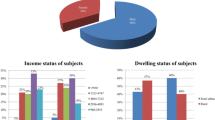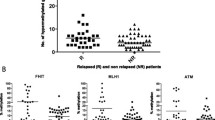Abstract
Aim. Detection of methylation in the p16 gene, an inhibitor of cyclin D-dependent protein kinase, as a new tumor marker for early detection of esophageal squamous cell carcinoma (ESCC) in DNA derived from blood and serum.
Method. A large family with clustering of ESCC was assessed in Khorasan province in northeastern Iran. The family had three histologically proven cases of ESCC in two consecutive generations and several other deceased cases with histories of ESCC. DNA from blood of 28 living family members in three consecutive generations, 30 sporadic ESCC cases (from serum, blood, and tumor tissues), and 30 healthy volunteers (from blood) were examined for the methylation status of p16 promoter using methylation-specific PCR (MSP).
Results. Aberrant p16 promoter methylation was found in 64.3% (n=28) of ESCC family members and none (n=30) of our normal volunteers. Five of the 28 family members with esophageal cancer symptoms had negative endoscopy results for ESCC, while four of these members had p16 hypermethylation in their blood. The family members with negative endoscopy and positive p16 promoter methylation are being monitored closely for signs of ESCC development through regular check-ups and chromoendoscopies. In sporadic ESCC in northeastern Iran, 73.3% (n=30) of tumor tissue samples had p16 hypermethylation. Serum and blood samples from the same patients showed p16 hypermethylation in 26.6% and 43.3% of the samples, respectively.
Conclusion. Aberrant p16 methylation may be a valuable diagnostic tool as a tumor marker for the early identification of individuals in high risk ESCC families.
Similar content being viewed by others
References
Schrump DS, Altorki NK, Forastiere AA, Minsky BD. Cancer of the esophagus, in: Cancer Principles and Practice of Oncology. 6th Ed., Vol. 1, DeVita VT, Hellman S, and Rosenberg SA, eds. LWW Publishers, New York, NY, 2001, p. 1051.
Anker P, Mulcahy H, Stroun M. Circulating nucleic acids in plasma and serum as a noninvasive investigation for cancer: time for large-scale clinical studies? Int J Cancer 2003;103:149–152.
Jeannon JP, Wilson JA. Cyclins-dependent kinases, cyclin-dependent kinase inhibitors and their role in head and neck cancer. Clin Otolaryngol 1998;23:420–424.
Herman JG, Baylin Stephen B. Gene silencing in cancer in association with promoter hypermethylation. N Engl J Med 2003;349:2042–2054.
Rountree MR, Bachman KE, Herman JG1, Baylin SB. DNA methylation, chromatin inheritance, and cancer. Oncogene 2001;20:3156–3165.
Belinsky SA, Nikula KJ, Palmisano WA, et al. Aberrant methylation of p16 (INK4a) is an early event in lung cancer and a potential biomarker for early diagnosis. Proc Natl Acad Sci USA 1998;95:11,891–11,896.
Herman JG, Graff JR, Myohanen S, Nelkin BD, Baylin SB. Methylation-specific PCR: a novel PCR assay for methylation status of CpG islands. Proc Natl Acad Sci USA 1996;93:9821–9826.
Tokugawa T, Sugihara H, Tani T, Hattori T. Modes of silencing of p16 in development of esophagel squamous cell carcinoma. Cancer Res 2002;62:4938–4944.
Ng MH, Chung Y, Lo KW, Wickham NW, Lee JC, Huang DP. Frequent hypermethylation of p16 and p15 genes in multiple myeloma. Blood 1997;89:2500–2506.
Shiseki M, Rusin M. Detection of aberrant p16 methylation in serum of liver cancer patients. Cancer Res 1999;59:71–73.
Sanchez-Cespedes M, Esteller M, Wu L, et al. Gene promoter hypermethylation in tumors and serum of head and neck cancer patients. Cancer Res 2000;60:892–895.
Hibi K, Taguchi M, Nakayama H, et al. Molecular detection of p16 promoter methylation in the serum of patients with esophageal squamous cell carcinoma. Clin Cancer Res 2001;7:3135–3138.
Kamangar F, Strickland PT, Pourshams A, et al. High exposure to polycyclic aromatic hydrocarbons may contribute to high risk of esophageal cancer in northeastern Iran. Anticancer Res 2005;25:425–428.
Author information
Authors and Affiliations
Corresponding author
Rights and permissions
About this article
Cite this article
Abbaszadegan, M.R., Raziee, H.R., Ghafarzadegan, K. et al. Aberrant p16 methylation, a possible epigenetic risk factor in familial esophageal squamous cell carcinoma. Int J Gastrointest Canc 36, 47–53 (2005). https://doi.org/10.1385/IJGC:36:1:047
Issue Date:
DOI: https://doi.org/10.1385/IJGC:36:1:047




